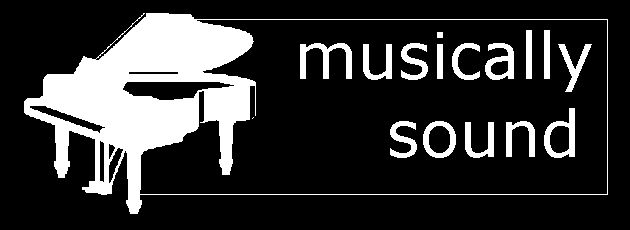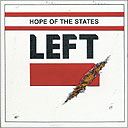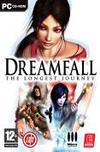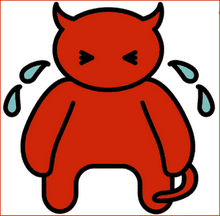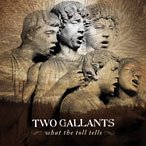 Two Gallants
Two GallantsWhat The Tell Tolls
[Country / Punk]
Two Gallants are the latest signing to Saddle Creek, and one of the few bands on the roster not to originate in Omaha, Nebraska, home of the label. These San-Franciscans play a blend of literate (hence the James Joyce inspired name), narrative-based, country-folk-soul-punk-blues-rock that sounds like asphalt and whisky with a twist of gunpowder and old leather.
The album is immediately arresting; opener "Las Cruces Jail" is a straight-up loud/quiet cowboy song that kicks harder than an angry mule. Everything evokes the mood perfectly; from the whistling melody to the atmospheric noises of a windy canyon. After the quiet opening, the strident lyrics "Well I spent last night in Las Cruces Jail / Raining hail, born to fail / Nobody coming for to go my bail / Sun don't you rise no more" catch the listener by surprise and from that moment on, you'll be humming this dust-soaked tale of a young gunfighter awaiting the noose all week.
A slightly more laid-back track follows; but one easily the equal of the opener in terms of narrative and flavour; "Steady Rollin'" manages to tell the story of a disillusioned wife-murderer in a manner poignant and sympathetic; "My loving lady she's a ball and chain / I still can travel but my speed is changed".
These two are not the only highlights on the album; "Long Summer Day" is another fine example of good storytelling; this time racial injustice comes under fire from the central character "The summer day makes a white man lazy / He sits on his porch, killing time / I've got to work to feed my wife and baby / I work so goddamn hard that it's a crime". The song culminates in a glorious, soaring conclusion, in which the man decides to take justice into his own hands. "The Prodigal Son" is a much softer song, with a delicate, memorable melody and lyrics that do exactly what they say on the tin; "I'm well known in story, famous in song / The black sheep, the blemish, the one who went wrong."
So what's wrong with this album? Well, firstly it suffers from what I'd like to christen "EP syndrome". Distilled, it would make a damn fine EP, but as it is it seems stretched into an album. At only nine tracks, the length is stretched by the fact that four of the tracks are over eight minutes long. Now I'm not one who shys away from epics, but let me repeat that; four of the tracks are over eight minutes long (and two of them are pushing the ten minute mark). There comes a point where words like "sprawling" dont really apply anymore. It's not that they are bad tracks, by any means, but frankly, these nostalgic poets need an editor. I'm willing to forgive them "Waves of Grain" as a majestic album closer and a great parting shot at American complacency, but frankly the bible-infused death throes of "Threnody" are borderline painful. "Age of Assasins" has a nice little ramshackle chorus, but could have been fitted by a less self-indulgent band into five minutes.
"Some Slender Rest" benefits from being couched between "Steady Rollin'" and "Long Summer Day" but it's still three minutes longer than it needed to be. The only track I haven't covered so far is the ultra-lo-fi "16th St. Dozens", which is (mercifully) a relatively petite five minutes and enhanced by an excellent ska-sounding trumpet part, which remains somewhat underused, only entering at the end of the track.
Overall, then, congratulations to Two Gallants; you've made my favourite EP of the year. Now quit being lazy, exercise some quality control and follow it up with the album you are evidently capable of making. 75
